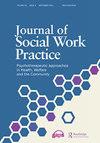Helping us heal; how creative life story work supports individuals and organisations to recover from trauma
IF 1.4
4区 社会学
Q3 SOCIAL WORK
引用次数: 1
Abstract
ABSTRACT This article discusses the implementation of a new creative life story work project within a statutory children’s services department of a UK Local Authority. The project looks to strengthen the use of life story work within statutory children’s social work teams, involving the introduction of a model developed by Professor Richard Rose. Staff training is provided, and creative life story groups with care experienced young people are led jointly by professional artists and children’s social care staff. As a social worker, I support the implementation of the project and offer any additional therapeutic support children attending the groups might need, including more in-depth individual therapeutic life story work. I explore here the dynamic nature of life story work in children’s social work, including a critical analysis of the use of self, and consider theoretical application and wider critiques of the model. I discuss some of the (often contested) literature in relation to trauma, before employing a psychosocial approach that draws on systemic and psychoanalytic theory in order to understand how creative life story work supports individuals and organisations in recovery from trauma and provides the potential to invite bigger questions in relation to how to reignite creativity and social pedagogy in social work practice.帮助我们愈合;创造性的生活故事工作如何支持个人和组织从创伤中恢复
本文讨论了在英国地方当局的法定儿童服务部门实施一个新的创造性生活故事工作项目。该项目旨在加强在法定儿童社会工作团队中使用生活故事工作,包括引入理查德·罗斯教授开发的模型。提供员工培训,由专业艺术家和儿童社会关怀人员共同带领有照顾经验的青少年组成创意生活故事小组。作为一名社会工作者,我支持该项目的实施,并提供参加小组的儿童可能需要的任何额外的治疗支持,包括更深入的个人治疗生活故事工作。我在这里探讨了儿童社会工作中生活故事工作的动态本质,包括对自我使用的批判性分析,并考虑了理论应用和对该模型的更广泛批评。我讨论了一些与创伤有关的(经常有争议的)文献,然后采用了一种利用系统和精神分析理论的社会心理方法,以了解创造性生活故事工作如何支持个人和组织从创伤中恢复过来,并提供了在社会工作实践中如何重新点燃创造力和社会教育学的更大问题的潜力。
本文章由计算机程序翻译,如有差异,请以英文原文为准。
求助全文
约1分钟内获得全文
求助全文
来源期刊

Journal of Social Work Practice
SOCIAL WORK-
CiteScore
2.50
自引率
7.10%
发文量
39
期刊介绍:
The Journal of Social Work Practice publishes high quality refereed articles devoted to the exploration and analysis of practice in social welfare and allied health professions from psychodynamic and systemic perspectives. This includes counselling, social care planning, education and training, research, institutional life, management and organisation or policy-making. Articles are also welcome that critically examine the psychodynamic tradition in the light of other theoretical orientations or explanatory systems. The Journal of Social Work Practice is committed to a policy of equal opportunities and actively strives to foster all forms of intercultural dialogue and debate.
 求助内容:
求助内容: 应助结果提醒方式:
应助结果提醒方式:


